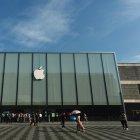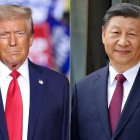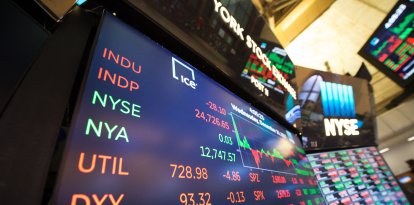iPhone, coffee, cars, clothes and much more: These are some of the products whose price could rise due to tariffs
Video game consoles and alcoholic beverages will also be strongly affected.

Food prices could rise sharply
On Wednesday, following President Donald Trump's official announcement on the implementation of reciprocal tariffs on 180 countries and territories, the world's leading economic analysts reacted with concern after the stock market collapsed, suffering its worst day since March 2020.
Some Wall Street banks, such as JPMorgan, even projected a possible recession and a stagflation scenario in the U.S. in 2025, especially starting in the third quarter of the year as tariffs begin to affect the country's trade performance.
With the certainty that tariffs will be applied at fixed rates and uncertainty about their duration, experts also began to anticipate price increases in various products including cell phones, computers, video game consoles, clothing, food, cars and a wide range of goods.
iPhone and Apple products
Apple, which after the announcement of the application of the new tariffs suffered $300 billion in market value, will see its products, especially those manufactured in China, rise in price, including iPhones, Apple Watches, AirPods and Mac computers.
In fact, experts expect a 43% increase in the price of iPhones, which could raise the price of the basic model from $599 to $856.
The most expensive models, such as the iPhone 16 Pro Max, could reach $2,300.
Tablets, computers and phones in general
It is not only Apple that will be affected by the tariffs. In general, the tariffs imposed on products from China (34%) will affect the entire technology market, generating price increases on different models of tablets, computers and cell phones.

Economy
JPMorgan es el primer gran banco de Wall Street en pronosticar una recesión en EEUU para este 2025
Emmanuel Alejandro Rondón

Economy
Los aranceles recíprocos provocan que Apple pierda más de $300.000 millones en valor de mercado en un solo día
Emmanuel Alejandro Rondón
Cars
The recently announced 25% auto tariffs will have a particularly notable impact. Analysts estimate that new cars produced in the U.S. will see an increase of between $2,000 and $5,000 due to multiple manufacturing parts being brought in from abroad, while some imported models could increase in price by as much as $20,000.
Coffee
Coffee will undoubtedly be one of the products affected, since approximately 80% of the coffee beans imported into the U.S. come from Latin America, especially Brazil and Colombia.
Both countries face a 10% tariff, which could result in increases in the price of coffee in the U.S. in the short term.
Olive oil
Olive oil, especially that imported from European Union from countries such as Spain, Italy and Greece, which will face 20% tariffs, could also rise in price considerably due to the measure.
Chocolate
Cocoa products, such as chocolate, should also suffer a price increase due to the fact that cocoa beans mostly come from countries such as Ivory Coast, Ecuador and Ghana, countries that received tariffs ranging from 10% to 21%.
Wine
Like olive oil, wine imported from the European Union should also experience a notable price increase in the U.S. The main wine suppliers to the U.S. are France and Italy, whose leaders have already condemned the tariffs set by President Trump.
Some analysts believe that it is possible that wine imports from Chile and Argentina, countries recognized for their excellent quality vintages, will increase considerably due to the 10% tariffs set for these countries.
Whisky
Scotch whisky, as well as other types of alcoholic beverages imported from the UK, should face a price increase due to a 10% tariff. This will especially affect popular brands of Scotch, which could cause consumers to pay more for premium imported bottles.
Dairy products
Like other imported products, cheese from the European Union will be affected by the 20% tariffs, which will directly affect popular varieties such as Parmigiano Reggiano, brie and gouda.
In view of this situation, Italy, France, Spain and the Netherlands, the main exporters of these products, will see their competitiveness in the U.S. market suffer a severe setback.
Moreover, since these types of cheese are already highly priced due to their origin and quality, any considerable increase would make them inaccessible to many U.S. consumers.
Toys
Tariffs on products from China will not only affect technology products, but also toys, including popular Mattel products such as Barbie and Hot Wheels.
According to market analysts, approximately 80% of imported toys in the U.S. come from China, the world's largest factory. As a result, prices are expected to rise as a result of the tariffs, making it increasingly complex for U.S. parents to buy toys for their children.
Meat
While about 90% of beef consumed in the United States is produced locally, tariffs applied to countries such as New Zealand, Australia and Argentina, all with tariffs of 10%, could exacerbate the pressure on prices.
Footwear
Footwear, which generally comes from China or other Asian producers such as Indonesia, will face a significant increase in price due to high tariffs imposed on Asian countries. China, for example, is the largest exporter of footwear to the U.S. and faces a 54% aggregate tariff, so consumers will logically pay more for brands and styles that tend to be popular with U.S. shoppers, including Nike, Adidas, Puma, Vans and others.
Apparel
Clothing, mostly also imported from China, Bangladesh and other Asian countries, will also see an increase in prices.
With rates reaching up to 49% in some countries, consumers will see basic items, such as T-shirts and jeans, become increasingly expensive as the tables turn.
Fruit
Fruit imports will also be affected by the new tariffs. Guatemala, Costa Rica and Peru, which face flat tariffs of 10%, account for a considerable share of fruit imports into the United States. Guatemala, for example, is a major exporter of bananas, melons, plantains and papayas, while Costa Rica stands out for its shipments of pineapples, avocados and mangos.



























